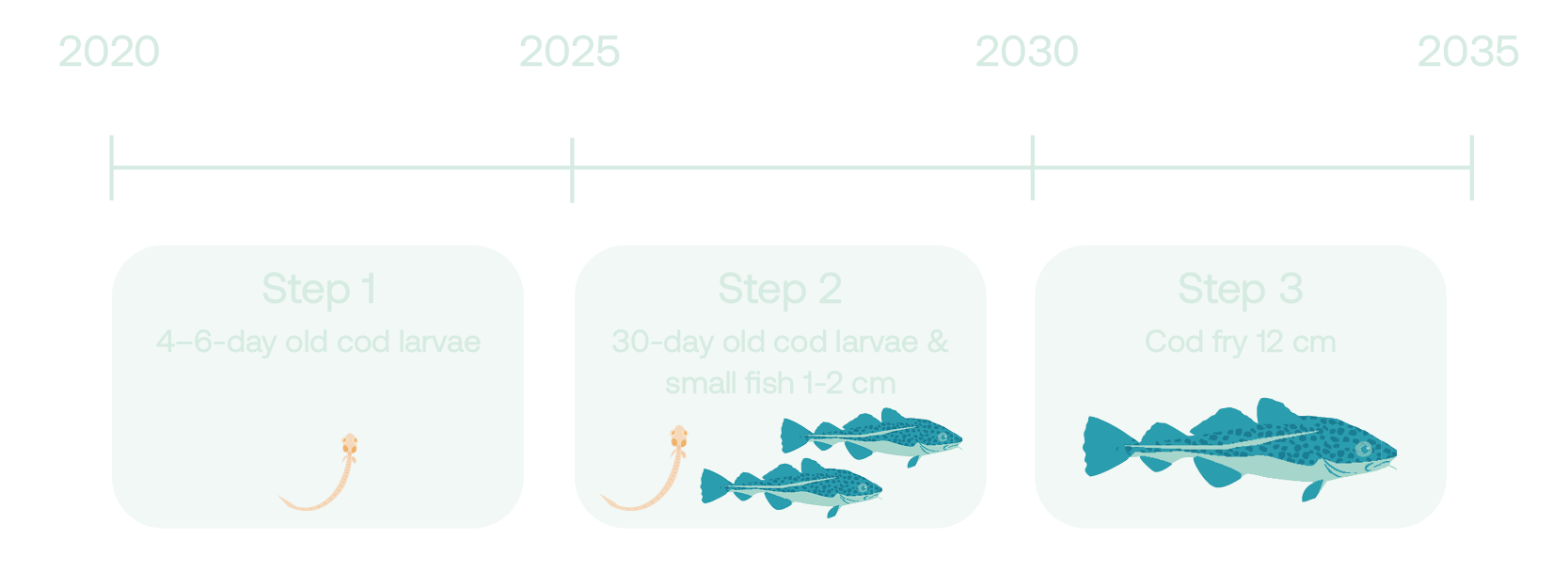The Baltic Sea is a unique but vulnerable environment with a small exchange of water, varying salinity, and large areas with dead zones. Cod is one of the Baltic Sea’s most important fish species, from an ecological, and previously economic perspective. Today, the Baltic Sea cod stocks are facing an acute situation due to decades of overfishing and unsustainable management.
Cod depend on a certain level of salinity and oxygen to be able to breed. The cod eggs need to float a bit above the bottom; however, the oxygen-depleted bottoms and the low salinity make the eggs sink to the bottom and die. Presently, there is only one place left in the southern Baltic Sea with the right conditions for successful cod reproduction.
In order for the stocks to recover in the Baltic Sea, a number of different measures are required, ranging from reducing the effects of eutrophication to continued regulations for cod fishing.
First step, 2020-2024
The project ReCod – release of small cod in the Baltic Sea started with the aim of testing whether it is possible to help cod past the vulnerable egg stage and thus increase the number of small cod in the sea as a step in strengthening populations. The demonstration project was carried out at the Ar research station on Gotland – in the middle of the Baltic Sea. Baltic cod from the eastern stock was continuously caught in order to later reproduce via natural spawning at the research station. The 4–6-day old cod larvae, i.e. fry that have passed the egg stage, were then released at selected locations in the Baltic Sea. Within the project, approximately 1-1.5 million cod larvae have been released annually. Test fishing and scientific-based sampling will be conducted continuously to follow up the project. The results will provide important information on the survival of released cod larvae, their ability to establish themselves in new locations and the cost of doing so. If the measure is successful, it could provide a template for future large-scale efforts to strengthen the cod populations.
Next steps, 2025-2034
The first four years at the Ar research station have provided new knowledge about keeping fish, hatching small cod larvae and releasing them in selected locations in the Baltic Sea. The next step is to feed the cod larvae until they are about 30 days old and then to small fish – 1 to 2 cm in size, for release into the Baltic Sea. Stage 2 will start in 2025 and last until 2029. In Stage 3, which is planned for 2030-2034, cod fry will be grown to about 12 cm before release. The aim is to find the best age and size of fish for release – both in terms of survival an cost. Research and method development will be carried out throughout the project period.
From 2025, the ReCod – release of small cod in the Baltic Sea project will be conducted at BalticWaters new fish research laboratory.

ReCod – release of small cod in the Baltic Sea is conducted and financed by BalticWaters in close cooperation with Uppsala University. In addition, there are a number of partners who contribute to the project in various ways: Bank of Åland through their programme Baltic Sea Project, Ørsted, Leader Gute, Region Gotland, Swedish University of Agricultural Sciences, Sörmlands Sparbank and the Ulla and Curt Nicolin Foundation.
From 2025, the ReCod project will be conducted at BalticWaters fish research laboratory, which is being built outside Nyköping.
